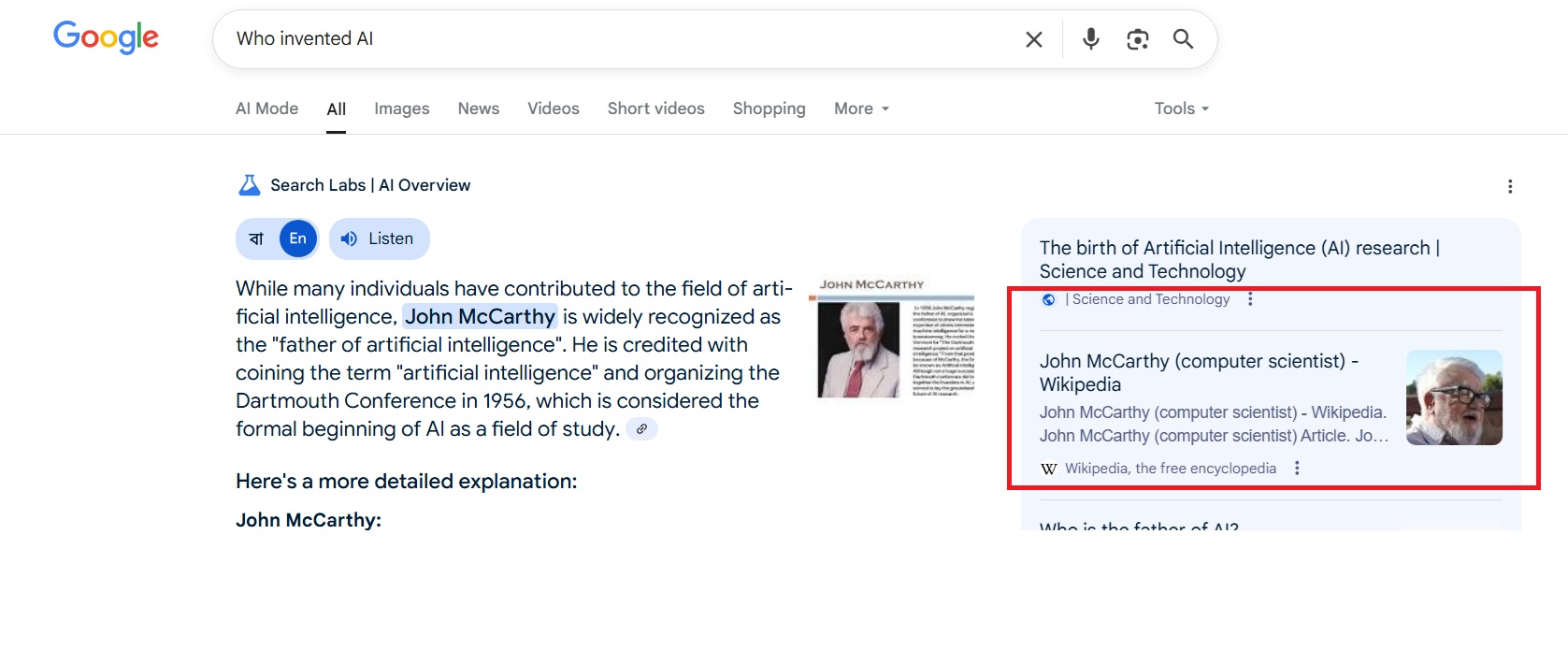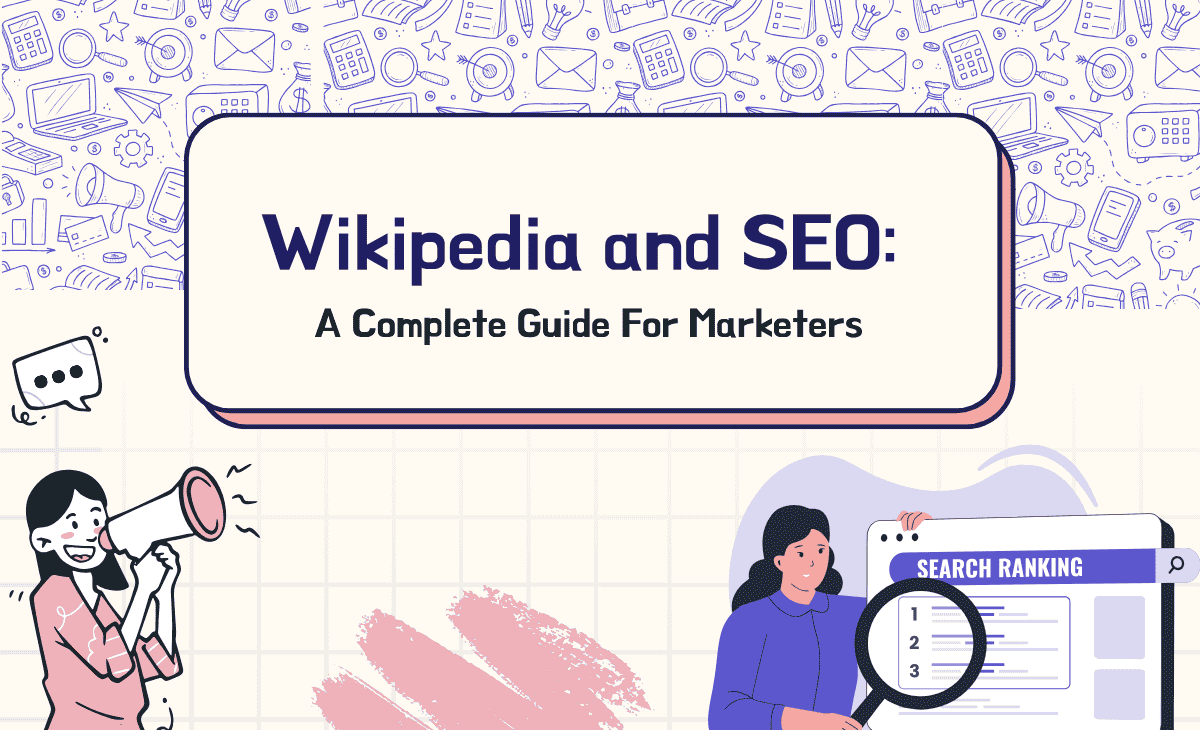For most of us, the early days of using the internet meant relying on Wikipedia information. It was the holy grail for students, researchers, and, to an extent, marketers alike. But our search dynamic has now changed. As the big brands compete for Google’s attention, we have all the information that we need provided on a platter.
However, even with this shift in the dynamic, Wikipedia is not only relevant, but can be a great asset when it comes to SEO. Wikipedia and SEO can be an iconic duo once you understand their true potential.
If you think about it from a marketing perspective, Wikipedia is the 7th most popular website in the world, with traffic of 4.2B visits per month. The level of exposure or the trust signals it can fetch for your brand can be huge.
But it is not always the traditional route with Wikipedia, as it is not an automated platform that picks articles randomly. There are layers and technicalities to it that one needs to understand if they wish to be cited.
In this blog, we talk about these technicalities and help you assess how, as a brand, you can leverage them in your favor.
Why is Wikipedia Important for SEO?
One of the major challenges of search engine optimization is convincing Google that you are a credible source. It takes time and a lot of patience to build authority and see those numbers.
In a situation like this, a recommendation from a recognized source like Wikipedia is always going to make it easier. This is why the idea behind relying on Wikipedia for SEO is based on two things: getting exposure and building trust. Here is a deeper analysis of the same:
- Google’s Knowledge Graph: That instant answer you see when you search for a fact on people, places, things, and the relationship between them is known as Google’s knowledge graph. It's a massive database that acts as a quick and instant encyclopedia. Needless to say, it powers the AI overview as well.
Wikipedia is one of those constant sources that Google is known to cite for its Knowledge Graph. Hence, as a marketer, it provides you the opportunity or access to be featured on the side panel, or in short, the potential to tap into huge traffic.
Here is a quick example:

💡Quick Fact: You have to remember three things while you try to understand Wikipedia from an SEO perspective: It’s highly structured, neutral, well-cited and continuously updated
- Wikipedia’s Domain Authority and Page Rank: Think of a high authority website that doesn’t require you to pay for the backlinks! Sounds amazing, right? Well, this is what relying on Wikipedia for SEO strategy looks like.
If Wikipedia references your work, readers discover you organically. Also, when Google sees that a high domain authority site like Wikipedia cites your work, it automatically boosts your credibility.
- Value of referral traffic from Wikipedia citations: Wikipedia doesn’t work the way the LLMs processes content. It is not automated, and every article that gets picked by Wikipedia is usually done manually. Hence, this plays a major role in satisfying Google’s E-E-A-T criteria (Experience, Expertise, Authoritativeness, Trustworthiness).
Think about it this way: how will the user know you are credible if not for a trusted source telling them so?
Understanding Wikipedia’s Link Structure: No Follow, Link Juice, and SEO Value
At this point, you must be wondering how a Wikipedia citation can do so much even though it doesn’t satisfy the traditional link juice criteria. As per SEO terms, Link Juice is when the authority is passed from one page to another.
For example, if a website with a high authority refers to your backlink, you can in turn boost your website's rank and trustworthiness. But there is a catch: Wikipedia always cites an external website as a nofollow link (rel="nofollow”) that alerts a search engine not to pass the authority to the linked website.
To put it in simpler terms, it's Wikipedia telling Google that I have cited this website to establish my point, and that’s it. But I’m not endorsing or transferring authority to it. This enables Wikipedia to have a neutral stance and make sure no one can buy their way into credibility.
Example of a no follow link:
<a href="https://www.nytimes.com/example-article" rel="nofollow">The New York Times</a> The Hidden SEO Value of Wikipedia Citations
Here is the thing: Wikipedia can be a significant SEO asset even with its No Follow links. Since most of us tend to miss out on the fact that it's not always about the direct transfer of authority through backlinks. It can be through citations and mentions as well.
In today’s competitive times, it's more about establishing a semantic trust and letting Google know you are “worthy” of Wikipedia's referral. It is a sign for both Google and your readers that you are a legitimate source.
The fact that real human minds have chosen your work and cite it to provide information not only impresses Google but various other LLMs as well. It once again impacts your brand’s online visibility.
Moreover, sometimes journalists, vloggers, and content creators often use Wikipedia as a research source. Hence, if your link is cited there, others might discover your content and link to it in their own articles, giving you link juice.
Wikipedia’s Role in Semantic SEO and Entity Building
We have moved past a search habit that only used to rely on keywords. It is not about the “best AI tools in 2025” anymore. It has evolved into something more detailed and acknowledges the importance of the search intent more than ever.
SEO now tries to understand the meaning behind queries and match them with known entities like people, brands, organizations, and concepts. For example, instead of just searching for “best AI tools in 2025,” users might now look for “Trusted AI tools for video generation used by content creators.”
So if your work is cited or your brand is mentioned on Wikipedia, you can expect Google to associate your name with relevant topics or industries. This increases your chances of showing up for related queries, featured snippets, and even AI Overview. Or in short, a major long-term boost for SEO and discoverability.
🎉Fun Fact: You can use tools like Google Alerts, WikiWatch, or Ahrefs to monitor if or when Wikipedia starts citing your content.
How to Get a Wikipedia Citation
Writing to get a Wikipedia citation is similar to writing for Google’s approval or to win over your readers. However, it is slightly different from writing a blog and waiting for results. You can get a Wikipedia citation either when editors pick up your content manually or when you visit a relevant article and request an edit to include your reference.
But you have to keep in mind that your content needs to be non-promotional. For example, if you run a SaaS tool website, you can be cited by Wikipedia if you can offer a neutral and informational viewpoint relating to SaaS.
✅ You have to rely on creating content that’s factually correct and is backed by credible sources. The only difference is that when you write for Wikipedia, it has to be purely educational or informational rather than a sales pitch for potential users.
✅ Another way to do this is to find relevant articles to your niche and look for broken links or Sections tagged with [citation needed]. This allows you to present your work upfront. You can even do a quick research and identify pages that cite older sources and suggest an edit accordingly.
✅ Make sure that you add the link in a citation format like:
<ref>{{cite web |title=AI History: Key Milestones That Shaped Artificial Intelligence |url=https://www.humanizeai.io/blog/article/ai-history-key-milestones-that-shaped-artificial-intelligencea |website=Humanize AI |date=2025-04-29 |access-date=2025-07-14}}</ref>. However, you can’t insert it in places or sources that are already backed by stronger academic sources unless it adds something new.
- Creating a Wikipedia account helps a lot in this case, as it adds to your credibility and makes sure your suggestions are accepted instantly.
- If all this feels like an overload of information for you, you can go to the “Talk” tab of the article and propose your citation to active editors. But you need to be sure about how your work adds value to the existing information.
When you cite an article for Wikipedia, you must shift your perspective from link building to adding valuable knowledge. This is how you make sure your citation stays relevant and is not flagged.
Ethical and Wikipedia-Friendly Practices
Wikipedia has no hard and fast rules as such to feature an article, but there are certain criteria one needs to follow. It is not only about avoiding promotional content or spammy posts. To begin with, you must understand its core values like neutrality, reliability, and public interest.
- Avoid Linking to Commercial or Landing Pages: Wikipedia’s main intention is to help its readers with valuable information. So if you link a landing page or a random commercial pamphlet, it will be removed.
- Avoid Using AI-generated Content as a Sole Reference: Do not try to push for content that’s AI-generated. Generally, the editors don’t accept AI-generated or rewritten content unless it’s backed by primary sources or verified facts. To improve your chances, you can always refine the tone and clarity using Humanize AI and present a stronger, more credible case.
- Avoid Promotional Usernames or Bios: You need to avoid usernames that are promotional in nature. For example, “YourBrandSEO” can appear as a marketing tactic, prompting the editors to remove your edits.
- Avoid Using Overly New or Self-Published Content: The editors will reject sources that are too recent, self-hosted, or haven’t been indexed widely. Your content needs to cite sources that evoke trust with the readers.
- Respect Wikipedia’s Notability Standards: You cannot write on anything and everything and expect it to be referenced on the site. Wikipedia has notability criteria in place, which make sure the published article has been covered in-depth by independent, reliable sources (like major news sites, academic journals, or industry publications). It cannot be a third party or self-published and, needless to say, promotional work.
The Takeaway: Wikipedia Is More Than Just a Citation
Wikipedia is not your regular backlink source, but you can think of it as a great friend with boundaries. There are certain things you must adhere to if you want to be on its favorite list.
As in today's world, trust and relevance matter more than ever, getting cited on Wikipedia can send a powerful signal to Google, to your readers, and even to other websites that might discover and refer to your work.
But you have to be mindful of what you put out there. Every edit is reviewed by volunteer editors who work to maintain the platform's integrity. They do not like content that feels promotional, violates Wikipedia’s core principles, or tries to cross a line.

